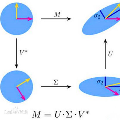The randomized singular value decomposition proposed in [25] has certainly become one of the most well-established randomization-based algorithms in numerical linear algebra. The key ingredient of the entire procedure is the computation of a subspace which is close to the column space of the target matrix $\mathbf{A}$ up to a certain probabilistic confidence. In this paper we employ a modification to the standard randomized SVD procedure which leads, in general, to better approximations to $\text{Range}(\mathbf{A})$ at the same computational cost. To this end, we explicitly construct information from the row space of $\mathbf{A}$ enhancing the quality of the approximation. We derive novel error bounds which improve over existing results for $\mathbf{A}$ having important gaps in its singular values. We also observe that very few pieces of information from $\text{Range}(\mathbf{A}^T)$ are indeed necessary. We thus design a variant of this algorithm equipped with a subsampling step which largely increases the efficiency of the procedure while attaining competitive accuracy records. Our findings are supported by both theoretical analysis and numerical results.
翻译:暂无翻译




